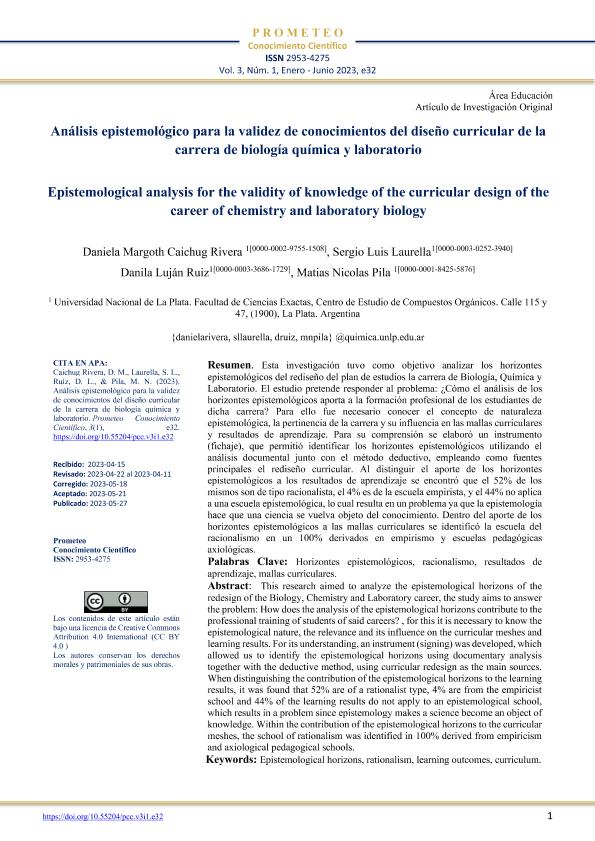Artículo
Esta investigación tuvo como objetivo analizar los horizontes epistemológicos del rediseño del plan de estudios la carrera de Biología, Química y Laboratorio. El estudio pretende responder al problema: ¿Cómo el análisis de los horizontes epistemológicos aporta a la formación profesional de los estudiantes de dicha carrera? Para ello fue necesario conocer el concepto de naturaleza epistemológica, la pertinencia de la carrera y su influencia en las mallas curriculares y resultados de aprendizaje. Para su comprensión se elaboró un instrumento (fichaje), que permitió identificar los horizontes epistemológicos utilizando el análisis documental junto con el método deductivo, empleando como fuentes principales el rediseño curricular. Al distinguir el aporte de los horizontes epistemológicos a los resultados de aprendizaje se encontró que el 52% de los mismos son de tipo racionalista, el 4% es de la escuela empirista, y el 44% no aplica a una escuela epistemológica, lo cual resulta en un problema ya que la epistemología hace que una ciencia se vuelva objeto del conocimiento. Dentro del aporte de los horizontes epistemológicos a las mallas curriculares se identificó la escuela del racionalismo en un 100% derivados en empirismo y escuelas pedagógicas axiológicas. This research aimed to analyze the epistemological horizons of the redesign of the Biology, Chemistry and Laboratory career, the study aims to answer the problem: How does the analysis of the epistemological horizons contribute to the professional training of students of said careers? , for this it is necessary to know the epistemological nature, the relevance and its influence on the curricular meshes and learning results. For its understanding, an instrument (signing) was developed, which allowed us to identify the epistemological horizons using documentary analysis together with the deductive method, using curricular redesign as the main sources. When distinguishing the contribution of the epistemological horizons to the learning results, it was found that 52% are of a rationalist type, 4% are from the empiricist school and 44% of the learning results do not apply to an epistemological school, which results in a problem since epistemology makes a science become an object of knowledge. Within the contribution of the epistemological horizons to the curricular meshes, the school of rationalism was identified in 100% derived from empiricism and axiological pedagogical schools.
Análisis epistemológico para la validez de conocimientos del diseño curricular de la carrera de biología química y laboratorio
Título:
Epistemological analysis for the validity of knowledge of the curricular design of the career of chemistry and laboratory biology
Fecha de publicación:
05/2023
Editorial:
Puerto Madero Editorial Académica
Revista:
Prometeo Conocimiento Científico
ISSN:
2953-4275
Idioma:
Español
Tipo de recurso:
Artículo publicado
Clasificación temática:
Resumen
Archivos asociados
Licencia
Identificadores
Colecciones
Articulos(CCT - LA PLATA)
Articulos de CTRO.CIENTIFICO TECNOL.CONICET - LA PLATA
Articulos de CTRO.CIENTIFICO TECNOL.CONICET - LA PLATA
Citación
Caichug Rivera, Daniela Margoth; Laurella, Sergio Luis; Ruiz, Danila Luján; Pila, Matías Nicolás; Análisis epistemológico para la validez de conocimientos del diseño curricular de la carrera de biología química y laboratorio; Puerto Madero Editorial Académica; Prometeo Conocimiento Científico; 3; 1; 5-2023; 1-15
Compartir
Altmétricas




